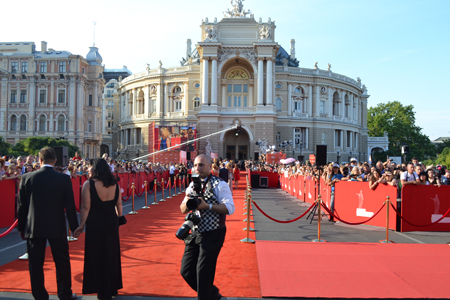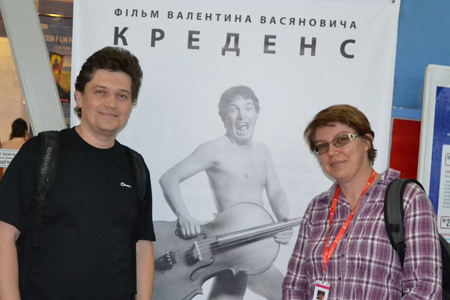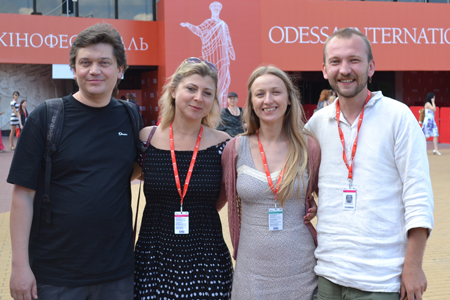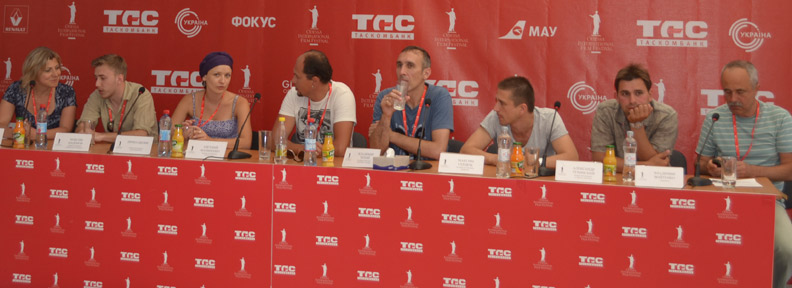July 29, 2013. Odesa - Kyiv |
Odesa International Film Festival. Notes from the Outside. |
| |
 |
| Red carpet of the Odesa Film Festival. |
For the first time ever, the Ukrainian Film Club of Columbia University had the chance to observe the Odesa International Film Festival (July 11-20, 2013) from within. Over the last four years, the OIFF has been growing in importance and visibility among those who take interest in the Ukrainian filmmaking scene. Conceived by Viktoria Tigipko, wife of Ukrainian oligarch Serhii Tigipko, the festival has grown thanks to generous private and government financial support. This year the Yanukovych regime earmarked some 1.5 million hryvnias (about US $200,000) for the festival. In many important ways the OIFF is very much a reflection of the current state of Ukrainian society and culture.
To begin with, it has a problem understanding the very rationale of its own existence. Other film festivals conceived by visionary individuals, like Robert Redford (Sundance) or Robert De Niro (Tribeca), have staying power thanks to their organizers' creating a niche of their own, a mission they took upon themselves to fulfill simply because there was a gap that needed filling. Thus, Sundance became the primary destination for independent films made in the USA and the rest of the world. Tribeca first turned filmmaking into an engine for the economic and cultural revival of a New York City traumatized by the attacks of September 11, 2001, and then made a name for itself by becoming the primary representative of the city's rich filmmaking to America and the world.
 |
| Director Valentyn Vasianovych and producer Iya Myslytska before world premier of Credenza. |
In stark contrast, the Odesa Film Festival is dramatically in need of its very own, unique face and mission. While the vast majority of film festivals are first and foremost platforms for their respective film industries, the way Ukrainian film is represented at Odesa is peculiar, to put it mildly: The words that come to mind are decorative, superficial, and half-hearted. From the very first minute of the festival, a Ukrainian visitor felt very much like a guest at somebody else's party. The entire opening ceremony was conducted in Russian (a supposedly minority language in Ukraine and Odesa), the only exception being the greeting from President Yanukovych, read in Ukrainian. The impression was that the festival organizers primarily addressed the audience of the now defunct Soviet Union, and not that of Ukraine or the rest of the world. Not a single festival or government official felt she should use Ukrainian during any of the events and none of them did. (A notable exception was events related to Ukrainian films). It never occurred to them that such flagrant disrespect of the language made them look in the eyes of many like agents of the Russian Federation and not the nation that pays their salaries. That Russian is not an international language its Soviet and post-Soviet champions would like us to believe hardly needs a proof. Its international status has been on the decline since the collapse of the Soviet empire. The prominence it still enjoys in the post-Soviet space is due to the coercive and often violent Russification visited upon non-Russian nations of the USSR. Festivals of truly international recognition use English as a working language. This was not always the case in Odesa. All foreign guests were left to guess what was being said during the opening ceremony, for the only English interpreter the organizers were able to find was tied up with Emir Kusturica and did not translate other speakers.
 |
| Ukrainian festival participants, (from left) directors Valentyn Vasianovych, Lesia Kalynska, Maryna Vroda, and sound director Andrii Nedzilsky. |
There were at least two sections dedicated to "Ukrainian" film—one competition for the "Best Ukrainian Feature Film" and one of Ukrainian shorts. With two notable exceptions (Valentyn Vasianovych's Credenza and Ihor Podolchak's Delirium) the former presented films that were made on the territory of Ukraine but mostly or fully devoid of any appreciable Ukrainian content. The critically acclaimed epic drama Khaitarma, the first ever Crimean Tatar feature narrative, was not accepted either for competition or even for a festival screening. The film is about the genocidal expulsion of the entire Crimean Tatar people on Stalin's order from their homeland in 1944 as traitors and Nazi collaborators. Very much like the Ukrainian Holodomor of 1932-1933 this is a page in Ukraine's history ignored and falsified within that country and largely unknown to the outside world. Apparently the OIFF's organizers felt uncomfortable with a subject that deeply questions the neo-imperial historiography of the last century emanating from Moscow today. Instead a new creation by producer Vladimir Khorunzhy, Synevir, directed by the Detochkin brothers, was screened for viewers incredulous that anybody could think of subjecting them to such a cruel combination of amateurishness, bad taste, ignorance, and racist clichés. That Synevir was advertized as the "first Ukrainian feature in 3D," made the disappointment from the film even more devastating.
The Ukrainian short competition was varied and rather interesting, but dramatically lacking in vision and cohesion. It is sadly true that with the lack of support for Ukrainian film and culture at large on the part of the Yanukovych government the organizers had a very limited pool of films to choose from. In addition, those who selected the films had a very tenuous idea of what a Ukrainian national film was. Thus in one and the same batch you would find very different products, sometimes opposite in terms of their national identification. There was, for example, the short Ukrainian Lessons (FIPRESCI Prize), directed by Ruslan Batytsky, acutely aware not only of its own national identity, but its civic sense of mission. It stood in stark contrast to The Road (Golden Duke for the Best Ukrainian Short), director Maksym Ksionda, whose protagonists seemed to fare straight from the Soviet past.
 |
| Press conference of participants of Ukrainian shorts competition. |
To say that the festival went out of its way to give prominence to its Ukrainianness would be a cruel joke. It did not. The hype was consistently generated around the Russian Film section. Though aptly introduced by leading film critic Volodymyr Voitenko, Ukrainian films were somehow featured only on the margins of the festival. There was not a single event to promote Ukrainian film or filmmakers that I was aware of. The Paradzhanov retrospective, however interesting, only enhanced the sense that Ukrainian film today solidly belongs in a museum, in the Soviet past. (I do not image that message was intended by the organizers, but often colonialist attitudes are reproduced and perpetuated by the colonized themselves.) There was no roundtable discussion on the subject that everybody who is anybody in Ukrainian film seemed to be talking about—the current state and future prospects of Ukrainian national film. If Ukrainian film was featured at Odesa, its presentation was rather half-hearted and lacking any appreciable enthusiasm. This felt rather strange and misguided given the very enthusiastic reception by the Odesan viewers of many Ukrainian films.
The resounding success enjoyed by the narrative feature Credenza, whose artistic merits, in my opinion, are more average than outstanding, visibly surpassed the expectations of its director Valentyn Vasianovych and producer Iya Myslytska. It was evidence, once again, of how very thirsty the public in Odesa and, arguably, the entire country, has been for a film with an identifiably Ukrainian story and protagonists, made in Ukrainian (even though some characters justifiably speak Russian), and with the Ukrainian (not Russian as in Russian Federation) viewer in mind. Credenza offered all of that telling a story of two generations of denizens of Lviv. The old ones are hold-outs of the Soviet regime, Russian settlers who were implanted into "liberated" Western Ukraine after WWII. They are arrogant, convinced of their cultural superiority, and incapable of learning not only the Ukrainian language but anything that is outside their self-imposed civilizational ignorance. The younger generation, their own children, are citizens of independent Ukraine with a desire for freedom and an unquestionable sense of belonging. It is only a matter of time before the two collide in a drama, or in this case a tragicomedy, both entertaining and, as the viewers' reception strongly suggested, cathartic.
The Odesa IFF was evidently unprepared for such reception of a Ukrainian film. Other than the post-screening discussion with the film cast and crew, no follow-up promotion event was offered by the organizers, despite the fact that the film won the FIPRESCI Prize. It is slated for a wide theatrical release in Ukraine on November 7, and will be screened in Kyiv and eventually in all provincial capitals of the country. (The Ukrainian Film Club has already obtained a DVD copy of Credenza and plans to screen the film at Columbia University and elsewhere in the United States.)
Most of the drawbacks of Odesa Film Festival are self-imposed rather than endemic. They are only endemic inasmuch as a colonialist Soviet mindset prevails among and informs its organizers. It is probably not news to each member of the OIFF organizing committee, well-traveled and familiar with world festival scene, that each and every international festival from Venice, Cannes, and Berlin to San Sebastian or Moscow, is primarily a platform for and promotion vehicle of its respective national film industry. That can hardly be said of OIFF. By promoting its respective culture, each and every film festival also powerfully projects its language into the international arena. This too cannot be said of Odesa Film Festival. In this respect the Festival is sadly beholden to a small group of politicians, who are quite open in their hatred of Ukraine, its language, and culture. One often hears a canard that Odesa is linguistically and culturally a Russian city. It just takes a walk along its streets and a will to address people in Ukrainian to discover that Odesa is very much a Ukrainian city. The problem is that its Ukrainian inhabitants have long been denied a voice in the media and the fact that this voice is absent from the Odesa Film Festival is only a continuation of this imperialist logic. By promoting a colonialist Russian culture and mindset, the festival dooms itself to being simply another instrument in the Kremlin's drive to regain control of its lost empire. By ignoring the culture of its own country, the festival seems inevitably narrow-minded, provincial, and derivative. The only originality it offers is the local Odesan inflection of Russianness, viewed by Russians themselves as funny, curious, and entertaining but ultimately inferior.
If this festival is to have a future, if it is to create and benefit from its own unique niche in the very busy international film festival scene, it needs to dump the vestiges of Russian colonialism and face Ukraine, its film, culture, and language. It needs to promote Ukrainian culture, Ukrainian talent and products with the same sense of pride and purpose that all other festivals unapologetically project. So far, for all the pomp, glamour, and buzz it has managed to create, the Odesa International Film Festival feels to be more of a Little Russian copy of the Moscow IFF and an ego-parade for its organizers, largely footed by the Ukrainian tax-payer it openly despises.
Yuri Shevchuk
|




